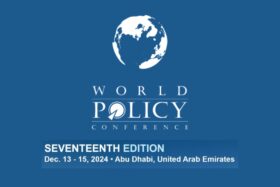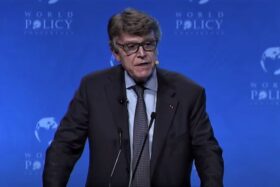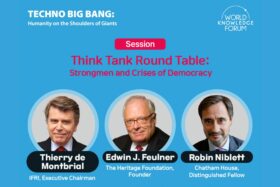On the threshold of the 17th World Policy Conference, I would like to remind you of the four main pillars that I reiterate year after year, varying the wording but always reflecting the same ideas:
First, the WPC is intended as an objective and realistic reflection on the state of the world, with a view to strengthening its governance, its capacity to ensure structural stability. The idea of realism refers to understanding reality as it is, and not as we would like it to be from an ideological point of view. The notion of governance refers to creating rules of the game that is accepted by the States, which intentionally use these rules to ensure structural stability, aiming at developing international relations in the smoothest way possible in an ever-changing context.
Secondly, since our first conference in 2008, we have consistently distanced ourselves from neoliberal globalization and the “flat world” concept from American author Tom Friedman. The world may be falling apart, but we believe that the globalization phenomenon is irreversible because of its technological foundations. Increasing openness always makes interdependency more complicated, but it also makes decisions more complicated, and therefore solutions become more difficult to find and implement. Miscalculations are on the rise, particularly within political regimes which are more liable to emotions. According to the law of action and reaction, excessive openness frequently leads to the opposite direction, closure. In democratic states, governments are often unstable and unpredictable. Hence the need to search for forms of global governance that will enable to maintain manageable levels of openness.
Thirdly, from the outset, the WPC has been committed to promoting middle powers in the architecture of global governance. We’re pleased to see that this simple idea has made great progress over the last 20 years.
Fourthly, it has become more apparent every year that technology can take both a constructive and destructive role in world order. It seems clear to us that a conference such as ours must aim at identifying technology’s potential contributions to global and regional governance (for example, to strengthen the European Union), thus helping to reinforce the structural stability the world needs to avoid moving towards chaos.
*
* *
I would like to remind you the origins of some of the major problems facing the international system today.
Globally, we can see with hindsight that peace in the Islamic world ended in 1979 with the Iranian revolution, followed by the Soviet invasion of Afghanistan. The end of 1979 was also marked by the siege of Mecca, and the whole of the 1980s by the Iran-Iraq war. The collapse of the Soviet Union then led to the invasion of Kuwait by Saddam Hussein’s regime. All these movements were behind the American support for the western Pakistan Mujahideen, which led to the defeat of the USSR and the overthrow of Saddam by the neoconservative President George W. Bush in 2003. Long story short: Al-Qaeda and ISIS. Then came the misnamed Arab Spring of 2011, which only served to increase the spread of fundamental Islamism and terrorism. On a different level, it can be said that from 1979 onwards, political Islamism replaced the ideology of nationalism that had spread with decolonisation.
The second major phenomenon that forged today’s world was the collapse of the Soviet Union between 1989 and 1991. The main protagonists of the Cold War have shown themselves incapable of co-managing the end of a period that dominated world history for almost fifty years after World War II. They’re jointly responsible for this failure, and we are all greatly suffering the consequences today. Instead of the advent of a new security framework in Europe, we have suffered the head-on collision of two antagonistic thrusts: the first towards what some consider as a desire to rebuild the Russian empire, and the second with the goal of extending what others call the American empire that is, in more neutral terms, the Euro-Atlantic institutions. Behind the emergence of BRICS and the Global South lies the desire for a majority of countries to avoid being caught between a rock and a hard place.
Another major phenomenon that also occurred at the end of the 1970s, which will perhaps appear to future historians as the most important, is the rise of China following the victory of its reformers. The West and China have gradually moved from friendly cooperation to confrontation. The major risk has been clearly identified as a “Thucydides trap” that could close around Taiwan.
I would like to end this short list by mentioning three other challenges: the future of the European Union, which has grown too quickly since the fall of the Soviet Union and is lagging far behind the United States and China in terms of technology; the economic and social consequences of Covid-19, which are still heavily felt; and climate change, which is becoming a global reality much faster than we anticipated, while the so called international community is struggling to respond appropriately.
*
* *
Where do we stand now?
There is currently no sign that jihadism is coming to an end. The latest events in Syria are a reminder of this fact. What has attracted the most attention since we met last year in Abu-Dhabi, however, is the war that began on October 7. 2023. The war is now well into its second year. We would probably be facing a bifurcation if, for example, Israel decided to annex the West Bank and intervene in Iran without or perhaps with the United States. In this case, it would be difficult to predict what the consequences might be in the region and beyond. Can we seriously imagine another way, a reset where Israel would go back to the two-state solution (Israeli and Palestinian) that emerged from the 1993 Oslo Accords and then collapsed following the assassination of Yitzhak Rabin? A two-state solution would obviously be favourable to Arab countries that aspire to peace and prosperity. In any event, if there’s one country that will play a fundamental role in shaping the course of history in the region, it is Iran. These topics will be discussed at length during the conference.
There are also at least two main scenarios for the way the Russian-Ukrainian war will develop. In the first scenario, a negotiation process would more or less begin quickly after President Donald Trump’s inauguration in the White House. Trump’s first step would be to call for a ceasefire prior to peace consolidation being established in the region. This would potentially pave the way for reconstructing a European security system. Whatever happens, this would only be the beginning of a long and difficult process. The second scenario, which cannot be ruled out any more than a move derailing around Taiwan, would see the conflict escalate and spread to NATO. Can we trust the wisdom of the main players in this drama to judge that it won’t come to that?
As far as the rivalry between the United States and China is concerned, everything currently suggests that neither the Chinese themselves nor the Americans are willing to risk a real war, even if they are preparing for one. Barring a major domestic crisis in China that is difficult to imagine happening soon, it is certain that the regime will continue to claim that Taiwan belongs to the PRC, as it has always done since its establishment in 1949. The Communist Party is playing and will continue to play as in a game of Go, particularly by investing in the East and South China Seas. American and Chinese analysts are aware of the devastating global impacts of a real war between these two superpowers. In concrete terms, confrontation between the two countries is most visibly centred on technological and commercial matters. We will have to analyse the outlook.
I’d like to add a word about the European Union, which has been notoriously weakening, as I said, since the collapse of the Soviet Union. Since its inception, the European Union has remained closely linked to the United States, which has always referred to the Euro-Atlantic institutions. A new era is likely on the horizon with Donald Trump’s return, and he is likely to focus China and the economy. American protection in Europe will no longer be guaranteed under the same conditions. The new period that is unfolding will be a decisive factor for the future of the transatlantic union and thus for the future of the European Union itself. It’s said, and sometimes rightly so, that great shocks are an opportunity for great renewal. There are many of us in this room who hope so, because a strong European Union is in the interests of each of its members but also, I am convinced, in the interests of the whole world. Because of its history and civilisation, this union is destined to become a major balancing factor for the advent of a new international system more conducive to peace and prosperity.
*
* *
When we look back on the history of the world, we realise how fragile peace is, locally and a fortiori globally. Generations of the happy globalisation era, at least in certain countries, wanted to believe in the advent of perpetual peace and the universal extension of prosperity. Today, we can only conclude that we are already entering a Second Cold War. The first, says historian Niall Fergusson, was a peace that was not a peace. The cold war that is beginning might not be a war. It is now up to all forces of goodwill, and in particular all of us gathered here, to think and act intelligently to contain and reduce the toxic impacts of this New Cold War. The main issue is definitely to ensure that the New Cold War does not degenerate into a full-scale world war.
Watch the replay of the opening ceremony of the World Policy Conference :



